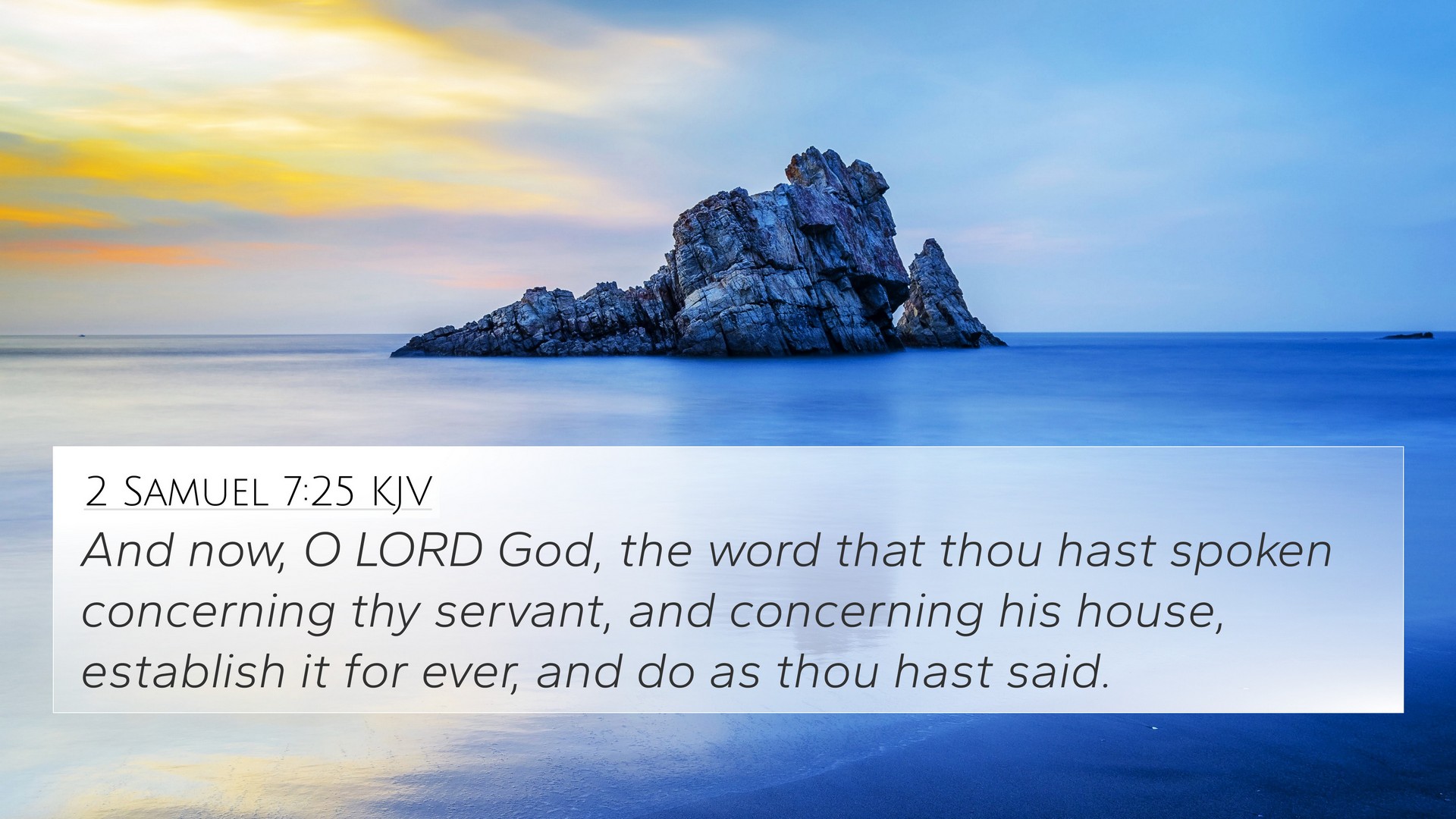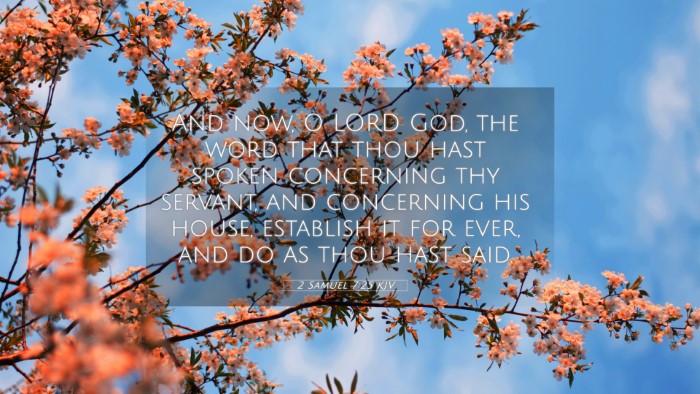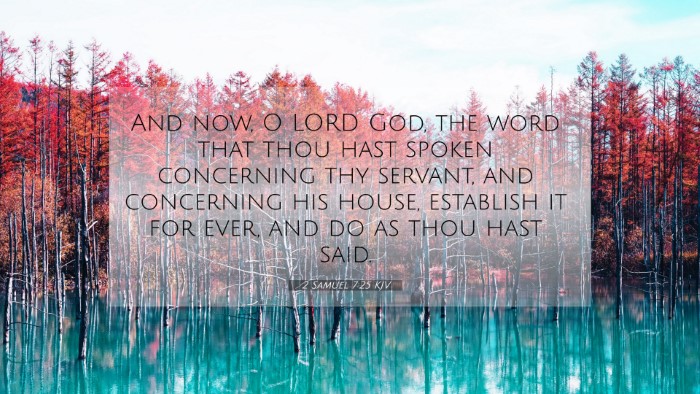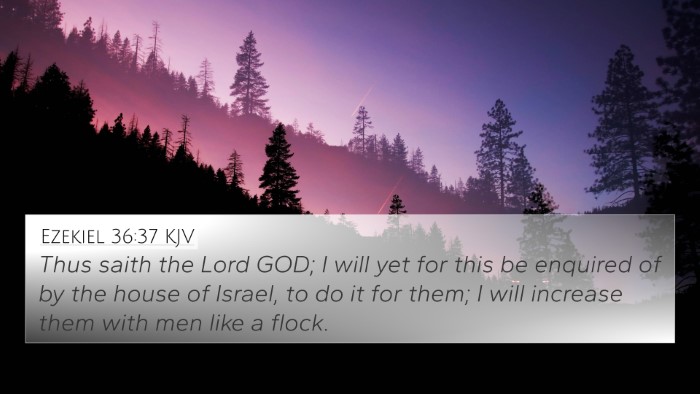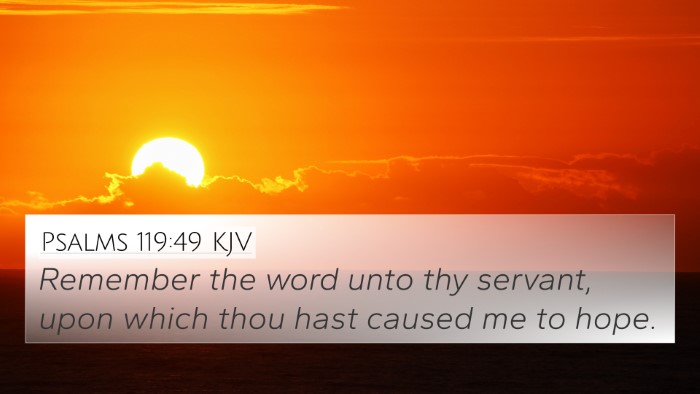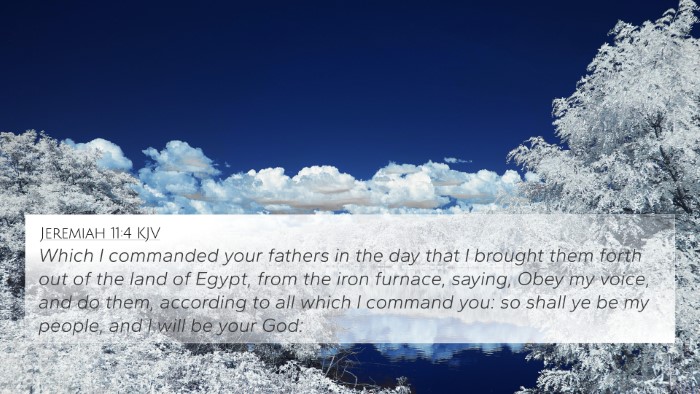Understanding 2 Samuel 7:25
Verse Context: 2 Samuel 7:25 states, "And now, O Lord God, the word that thou hast spoken concerning thy servant, and concerning his house, establish it for ever, and do as thou hast said." This verse is situated within God's covenant with David regarding his lineage and the establishment of his throne.
Combined Insights from Public Domain Commentaries
This passage is profound in its implications for understanding God's promise and faithfulness.
- Matthew Henry: He elaborates on the importance of David's appeal to God. David expressed a deep reliance on God’s word, knowing that it is God who establishes His promises. This reflects David's humility and recognition of God's sovereignty in fulfilling His covenant.
- Albert Barnes: Barnes notes that this prayer of David is a model for how believers should seek God's assurance. He highlights that David is not merely asking for confirmation of his house's stability but is affirming God's past declarations as the foundation for hope. The idea of 'establishing' draws on the permanence of God's promises.
- Adam Clarke: Clarke emphasizes the covenant nature of this promise, citing that God is ever faithful. He explains that David's house refers not just to his immediate family but extends to the messianic promise, which is ultimately fulfilled in Christ. Clarke's exposition links this verse to theological implications concerning the eternal nature of God's kingdom.
Thematic Connections
This verse is rich in thematic connections, reflecting crucial beliefs about God's unchanging nature and His promises.
- God's Faithfulness: The establishment of David's house is a testament to God’s unwavering commitment.
- Covenant Relationships: The principle of covenant throughout the Scriptures is present, highlighting relational dynamics between God and His people.
- Messianic Promise: This verse not only speaks to David but subtly foreshadows Christ, linking the Old Testament promise to New Testament fulfillment.
Bible Verse Cross-References
To deepen understanding and for comparative Bible verse analysis, it's vital to connect this verse with related scriptures. Here are some relevant cross-references:
- 1 Chronicles 17:24: "Let it even be established, that your name may be magnified for ever." This verse echoes the establishment aspect of David's lineage.
- Psalm 89:3-4: "I have made a covenant with my chosen, I have sworn unto David my servant." This psalm emphasizes God's covenant with David.
- Luke 1:32-33: "He shall be great, and shall be called the Son of the Highest..." This passage relates to the eternal throne promised to David.
- Isaiah 9:7: "Of the increase of his government and peace there shall be no end." This connects with the everlasting aspect mentioned in 2 Samuel 7:25.
- Romans 1:3: "Concerning his Son Jesus Christ our Lord, which was made of the seed of David..." This connects the New Testament reality back to David's lineage.
- Hebrews 1:8: "But unto the Son he saith, Thy throne, O God, is for ever and ever..." This encapsulates the promises established in David’s house.
- Acts 2:30: "Therefore being a prophet, and knowing that God had sworn with an oath to him, that of the fruit of his loins, according to the flesh, he would raise up Christ to sit on his throne." This emphasizes the prophetic nature of David's promise relating to Christ.
Applying the Insights
Understanding 2 Samuel 7:25 requires engaging in inter-Biblical dialogue. It encourages us to see not just ancient promises but how they reverberate through the Gospels.
Tools for Bible Cross-Referencing
Utilizing a Bible concordance or a Bible cross-reference guide is essential for exploring these connections. Proper engagement with these resources can lead to greater understanding of how Bible verses relate to each other. Comprehensive Bible cross-reference materials can facilitate deeper studies and enhance sermon preparation.
Conclusion
Ultimately, 2 Samuel 7:25 serves as a reminder of God’s enduring promises and their fulfillment. Studying this verse alongside its cross-references enriches our understanding of Scripture as a cohesive whole, provides a thematic lens through which to view God’s redemptive plan, and fortifies the believer's faith in God's unwavering commitment.
